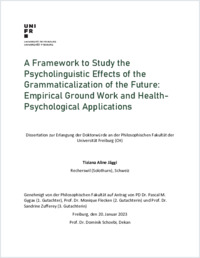A framework to study the psycholinguistic effects of the grammaticalization of the future : empirical ground work and health- psychological applications
SPR
- Jäggi, Tiziana
- Gygax, Pascal (Degree supervisor)
- Fribourg (Switzerland), 2024
1 ressource en ligne (138 pages) ; 1 fichier pdf
PhD: Université de Fribourg (Suisse), 20.01.2023
English
The link between language and thought has fascinated researchers well beyond the disciplinary boundaries of psycholinguistics. In 2013, an economics paper by M. K. Chen emerged that found a correlation between grammatical differences in how people refer to the future across countries and their propensity to save for their retirement. The paper was harshly challenged and criticized for its lack of experimental research. Nevertheless, the idea seemed compelling and some researchers began to experimentally investigate this claim. Most of these studies remained within the realm of behavioral economics and their experiments yielded inconclusive results. In light of this unresolved issue, this thesis focused on changing the experimental approach and applying psycholinguistic methodology, which may be better equipped to identify cognitive mechanisms that could be affected by the grammaticalization of the future. So, the first aim of this thesis was to formulate a theoretical framework that would allow us to hypothesize how grammatical differences in referring to the future influence our mental representations of future events. To achieve this goal, we proposed a theoretical framework (see Chapter 2) that summarized possible linguistic realizations of the future and relied on psycholinguistic hypotheses on language and thought, such as the Thinking-for-Speaking (TfS) hypothesis by Slobin (2003), and we identified several cognitive mechanisms that could be affected by the grammaticalization of the future. These mechanisms pertain mainly to perceived temporal distance and memory. Further, we chose to add an applied health-psychological perspective as the effects of the grammaticalization of the future on the hypothesized cognitive mechanisms could lead to more effective health messages.
However, the results of the first two studies conducted as part of this thesis (Chapters 3.1 and 3.2) did not confirm the hypothesized effect of the grammaticalization of the future. We found no effect on temporal distance or memory. Hence, in the last study (Chapter 3.3) we adjusted the theoretical framework to redefine the constituents of future time reference (i.e., how we linguistically refer to the future). With this shift in theory also a new cognitive mechanism emerged that could be studied: probabilistic reasoning. Again, we tested whether the grammaticalization of the future affects probabilistic reasoning. This time we found a small effect on the grammaticalization of the future, but not in the way we hypothesized. Lastly, we discussed methodological and conceptual issues that arose during this thesis and establish concrete measures for future research (Chapter 4). Generally, we concluded that the data from our initial experiments (Chapters 3.1 and 3.2) indicate no effect of the grammaticalization of the future on mental representations of future events. However, by expanding our theoretical framework and adjusting methodological considerations, our last study (Chapter 3.3) showed that the way the future is grammaticalized may affect mental representations of the future in certain contexts and under certain conditions.
However, the results of the first two studies conducted as part of this thesis (Chapters 3.1 and 3.2) did not confirm the hypothesized effect of the grammaticalization of the future. We found no effect on temporal distance or memory. Hence, in the last study (Chapter 3.3) we adjusted the theoretical framework to redefine the constituents of future time reference (i.e., how we linguistically refer to the future). With this shift in theory also a new cognitive mechanism emerged that could be studied: probabilistic reasoning. Again, we tested whether the grammaticalization of the future affects probabilistic reasoning. This time we found a small effect on the grammaticalization of the future, but not in the way we hypothesized. Lastly, we discussed methodological and conceptual issues that arose during this thesis and establish concrete measures for future research (Chapter 4). Generally, we concluded that the data from our initial experiments (Chapters 3.1 and 3.2) indicate no effect of the grammaticalization of the future on mental representations of future events. However, by expanding our theoretical framework and adjusting methodological considerations, our last study (Chapter 3.3) showed that the way the future is grammaticalized may affect mental representations of the future in certain contexts and under certain conditions.
- Faculty
- Faculté des lettres et des sciences humaines
- Language
-
- English
- Classification
- Psychology
- Notes
-
- Bibliographie
- License
- Open access status
- gold
- Identifiers
-
- SWISSCOVERY 991171927513505501
- DOI 10.51363/unifr.lth.2024.036
- URN urn:nbn:ch:rero-002-122336
- Persistent URL
- https://folia.unifr.ch/unifr/documents/329376
Statistics
Document views: 196
File downloads:
- JäggiTA: 142
